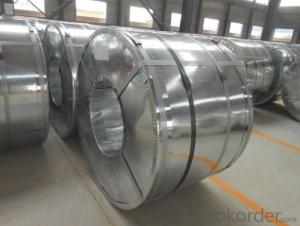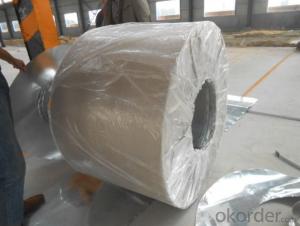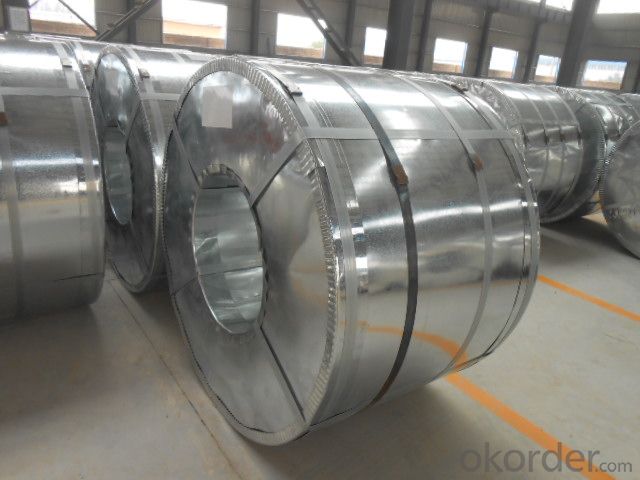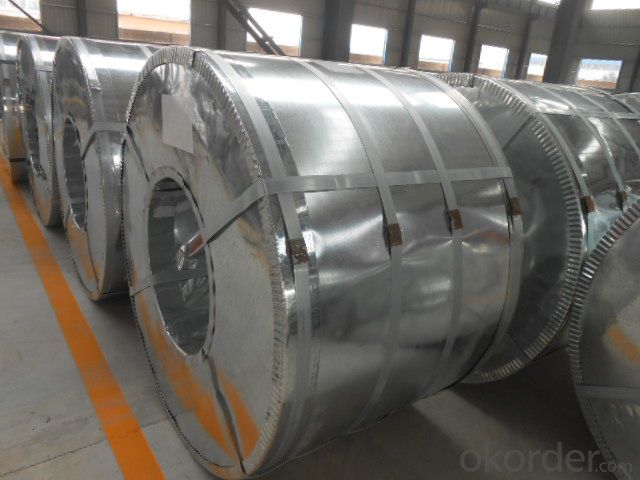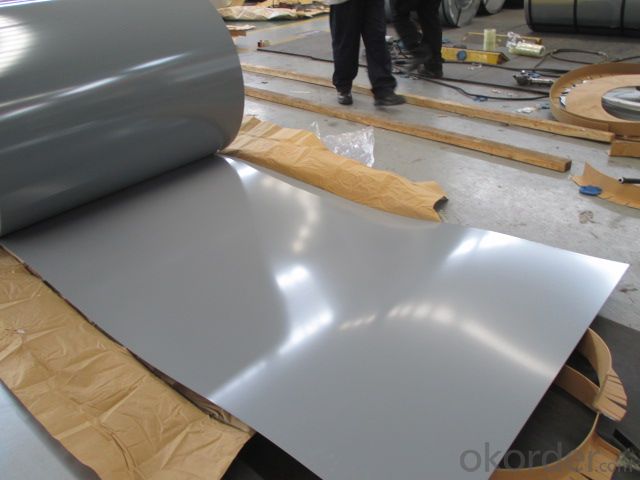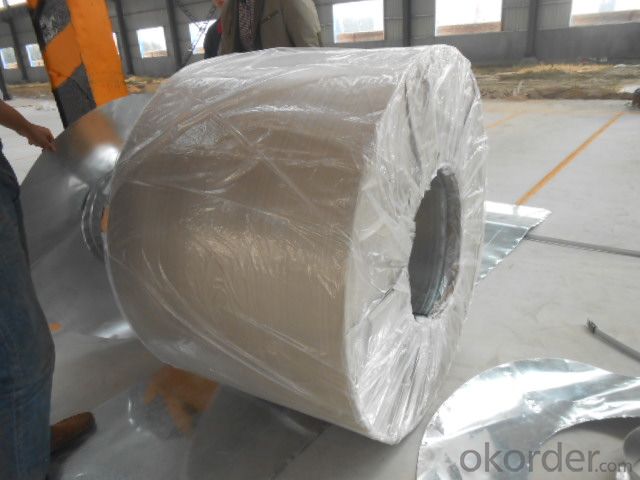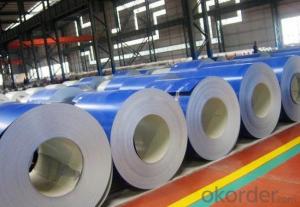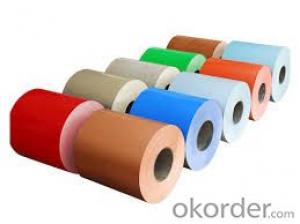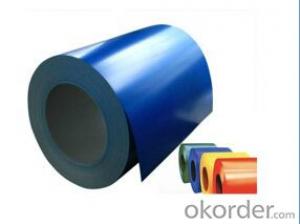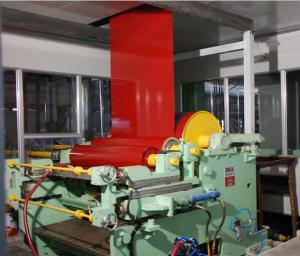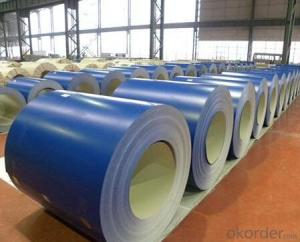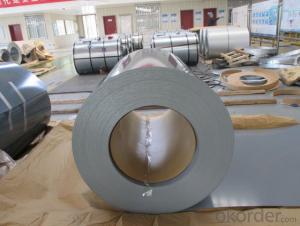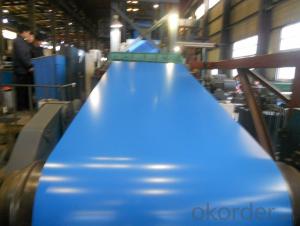PREPAINTED STEEL COIL zinc coating 120g/m2
- Loading Port:
- Tianjin
- Payment Terms:
- TT OR LC
- Min Order Qty:
- 50 m.t.
- Supply Capability:
- 10000 m.t./month
OKorder Service Pledge
OKorder Financial Service
You Might Also Like
PREPAINTED STEEL COIL
Packaging & Delivery
Packaging Detail: seaworthy export package
Delivery Detail: on request
Specifications
1. more than 10 years’ experience on this field
2. advanced equipments
3. competitive price
4. soonest delivery
Product Description :
Commodity
PREPAINTED STEEL COIL
Technical Standard: JIS 3312
Grade:CGCC
Types:Commercial / Drawing / Deep Drawing / Structural quality
Width: 900mm/1000mm/1219mm/1200mm/1220mm/1250mm
Thickness: 0.2mm~4.0mm
Type of coating: galvanized
Zinc coating: Z40-275g/m2,Z40-Z450g/m2
ID coil: 508mm or 610mm
Coil weight: 3-10/MT per coil
Package: Properly packed for ocean freight exportation in 20''container
Application:: home appliances, constructions, building, machineries
Our Advantages :
1. Expertise:
More than 10 years of manufacture: we know how to properly handle every step of production.
2. Competitive price:
We can offer competitive prices to our customers.
3. Accuracy:
We have excellent technicians and leaders, which can ensure our products are exactly what you want.
4. Materials:
All galvanized steel coils are made of high-quality raw materials.
5. Certificate:
Our products are certified by ISO9001.
6. Productivity:
We have large-scales of production lines,, which can guarantee all your orders will be finished in earliest time.
Hr CGL Technical Process:
Coil loading-> uncoiling-> cutting-> welding-> entry accumulator-> Heating and deoxidization-> galvanizing-> air cooling->water quenching-> air dryer-> tension leveler-> Passivation->air dryer->exit accumulator-> oiling-> cutting-> recoiling->coil unloading-> packing
The furnace heating style: improved Sendzimir heating technology
Hourly output: max.76.3t/h
Process after coating: tension leveling, Passivation or oiling
Our Service
Our quality
Test Equipments of Prepainted Galvanized Steel Coil : Salt-spray tester; Atomic absorption spectrophotometer; Rockwell typer hardness tester; Tensile test machine; Metrohm titration; Laboratory Bend test machine.
Our packing
Properly packed for ocean freight exportation in 20''container, galvanized metal fluted rings on inner and outer edges, galvanized metal & waterproof paper wall protection disk, galvanized metal & waterproof paper around circumference.
R&D department
R&D department concentrates on researching and developing reliable products with best quality. The quality department test and control every process of production to guarantee the best quality of product
- Q: How are steel coils used in the production of electrical motors?
- Steel coils are used in the production of electrical motors as they serve as the core component of the motor's electromagnetic system. These coils are wound around a laminated steel core to create an electromagnet that generates the magnetic field required for the motor's operation. The steel coils, when energized with electric current, produce a magnetic field that interacts with the stator and rotor to facilitate the conversion of electrical energy into mechanical energy.
- Q: How are steel coils used in the manufacturing of lighting fixtures?
- Steel coils are used in the manufacturing of lighting fixtures as they provide a sturdy and durable structure for the fixtures. The coils are typically shaped and formed to create the desired shape and design of the lighting fixture, ensuring its strength and stability. Additionally, the steel coils can be coated or painted to enhance the aesthetics of the fixture, making it more visually appealing.
- Q: How are steel coils used in the production of electrical systems?
- Steel coils are used in the production of electrical systems as they serve as the key component in the construction of transformers and electric motors. These coils are wound with insulated copper wire and when an electric current passes through them, they generate a magnetic field that enables the conversion of electrical energy into mechanical energy or vice versa.
- Q: How are steel coils used in the manufacturing of food packaging?
- Steel coils are commonly used in the manufacturing of food packaging as they provide strength and durability to the packaging materials. These coils are typically shaped into cans, containers, or lids, ensuring the preservation and protection of food products during storage and transportation. Steel coils help maintain the integrity of the packaging, preventing breakage or damage that could compromise the safety and quality of the food.
- Q: hey i was looking to buy a khukuri machete by cas iberia. its made of carbon steel but doesnt say which one. anyone that is into knives and all that know how this would hold up and the rust resistance of it? mostly be used for cutting bush and small trees
- Ricki is correct. There is no way to tell how much carbon is present just from the term carbon steel. It comes in a wide range of grades within the general classifications of low, medium, and high carbon steel. What you'll get depends on the quality of the knife. As the carbon content increases, the steel becomes harder, stronger, and more responsive to heat treatment. It also becomes more brittle, so a **very** high carbon steel would not be the best thing for a machete. As Ricki said, plain carbon steels are not rust resistant. However, I have had a carbon steel machete for over 40 years and it's just fine. If you take care of it, it will last.
- Q: and what are the four main elements in STAINLESS steel? x
- decreasing the carbon content fabric will strengthen the ductility, which will make it greater versatile. Carbon in metallic varieties brittle cementite (iron carbide) which will strengthen the hardness and capability of metallic.
- Q: How do steel coils differ in terms of size and weight?
- Steel coils can vary greatly in terms of size and weight depending on their intended use and production process. The size of a steel coil is typically measured in terms of its outer diameter, inner diameter, and width. The outer diameter refers to the total diameter of the coil, while the inner diameter refers to the diameter of the hollow center of the coil. The width of the coil refers to the distance between the two flat sides of the coil. In terms of weight, steel coils can range from a few hundred pounds to several tons. The weight of a coil is primarily determined by its size and the type of steel used. Coils made from high-strength steel tend to be heavier due to their higher density, while coils made from lower-grade steel can be lighter. The size and weight of steel coils are crucial factors in determining their transportability and handling. Smaller and lighter coils are generally easier to handle and transport, making them more suitable for applications where maneuverability is important. On the other hand, larger and heavier coils are often used in industries where strength and durability are essential, such as construction and automotive manufacturing. Overall, steel coils can vary significantly in terms of size and weight, allowing for a wide range of applications and customization to meet specific requirements in various industries.
- Q: What are the common defects in steel coil finishes?
- There are several common defects that can occur in steel coil finishes. These defects can impact the appearance and functionality of the steel and may need to be addressed before the coil can be used or sold. 1. Coil breaks: Coil breaks are a common defect where the steel strip breaks during winding or unwinding. This defect can result in a discontinuity in the surface of the coil and can lead to further damage if not addressed. 2. Edge wave: Edge wave refers to a distortion or waviness at the edges of the steel coil. This defect can occur during the rolling or cooling process and can affect the flatness and uniformity of the coil. 3. Corrosion: Corrosion can occur on the surface of steel coils if they are not properly protected or stored. This can lead to rust and degradation of the steel, impacting its strength and appearance. 4. Streaks and stains: Streaks and stains can occur on the surface of steel coils due to improper cleaning or contamination during the production process. These defects can affect the aesthetic appearance of the steel and may need to be addressed before the coil can be used. 5. Scratches and dents: Scratches and dents can occur on the surface of steel coils during handling, transportation, or storage. These defects can impact the flatness and surface quality of the steel and may require repairs or adjustments. 6. Coating defects: If the steel coil has a coating or paint applied to it, several defects can occur. These include blistering, peeling, or uneven application of the coating, which can affect the durability and appearance of the steel. It is important to note that these defects can vary in severity and may require different methods of repair or mitigation. Regular inspections and quality control measures can help identify and address these defects before they become more significant issues.
- Q: What are the common coil processing equipment used in the industry?
- Some common coil processing equipment used in the industry include coil slitters, coil flatteners, coil feeders, and coil recoilers. These machines are essential for processing metal coils into various shapes and sizes, allowing for efficient production and manufacturing processes.
- Q: How are steel coils inspected for weldability?
- Steel coils are inspected for weldability using various methods, such as visual examination, non-destructive testing (NDT) techniques like ultrasonic testing or magnetic particle inspection, and chemical analysis. These inspections help identify any surface defects, internal discontinuities, or impurities that may affect the weldability of the steel coils.
Send your message to us
PREPAINTED STEEL COIL zinc coating 120g/m2
- Loading Port:
- Tianjin
- Payment Terms:
- TT OR LC
- Min Order Qty:
- 50 m.t.
- Supply Capability:
- 10000 m.t./month
OKorder Service Pledge
OKorder Financial Service
Similar products
Hot products
Hot Searches
Related keywords
